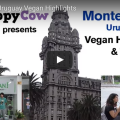Waiter – “Hello sir, how are you?”
Customer – “Hello, I’m very well, thank you.”
Waiter – “Are you ready to order sir?”
Customer – “Yes please. What do you recommend that is vegan friendly?”
Waiter – “How about chicken?”
Customer (confused) – “Excuse me please??”
Waiter – “How about chicken?”
Customer (still confused) – “But I don’t eat meat??”
Waiter – “Ah, you’re vegetarian as well.”
Customer (even more confused) – “How can someone be vegan without being vegetarian???”
Does the above conversation have any ring of familiarity? Regrettable as it is to say so, the above is a first hand account from being the customer in that conversation a few years ago. This is of course far from an isolated example. The more common scourge of so many a vegetarian is being in an omnivorous restaurant and on asking for vegetarian food, being offered fish.

(Fish. Eaten by pescetarians, not eaten by vegetarians.)
The point being made is that different people have different levels of understanding of different concepts within vegetarianism. Only going by personal experience rather than having any statistical evidence to back this up, in North America the understanding of the word vegan for example appears quite widely understood. Elsewhere vegan as a word appears much less understood among people who don’t mix with any sort of regularity in vegetarian circles. Even the word vegetarian itself appears hugely misunderstood by huge proportions of the earth’s population.
To try to help things along a little, here are some very basic terms and explanations associated with vegetarianism. Firstly to borrow some info from vegsoc.org/faqs
Vegetarian – The Vegetarian Society defines a vegetarian as: “Someone who lives on a diet of grains, pulses, nuts, seeds, vegetables and fruits with, or without, the use of dairy products and eggs. A vegetarian does not eat any meat, poultry, game, fish, shellfish* or by-products of slaughter.”
*Shellfish are typically ‘a sea animal covered with a shell’. We take shellfish to mean:
- Crustaceans (hard external shell) large – e.g. lobsters, crayfish, crabs. Small – e.g. prawns, shrimps
- Molluscs e.g. mussels, oysters, winkles, clams, and cephalopods such as cuttlefish, squid, octopus.
There are different types of vegetarian:
- Lacto-ovo-vegetarians eat both dairy products and eggs; this is the most common type of vegetarian diet.
- Lacto-vegetarians eat dairy products but avoid eggs.
- Ovo-vegetarians eat eggs products but avoid dairy.
- Vegans do not eat dairy products, eggs, or any other products which are derived from animals including honey.

(Crustaceans. Eaten by pescetarians, not eaten by vegetarians.)
So going back to the confusing dialogue with the waiter above…
Obviously the words ‘vegan’ and ‘vegetarian’ are not synonymous. Nor though are they mutually exclusive. As indicated by the definition provided by the Vegetarian Society above, vegan is a sub-type of vegetarian. Or if you prefer the mathematical term, vegan is a subset of vegetarian. That doesn’t mean though that something vegetarian is always vegan. This is similar for example to a thumb being a sub-type of finger. A thumb is a finger but a finger is not necessarily a thumb. Or another example, an apple is a fruit but a fruit may not necessarily be an apple.
In written form it is possible to use the term “veg*an”. The spelling of “veg*an” deliberately includes the use of the asterisk as a wildcard string. Thus “veg*an” is intended to mean “vegan and / or vegetarian”. This is a deliberate spelling of “veg*an” instead of “veg*n” since “veg*n” (without an “a” as the second last character) can also mean “vegetation”.
So what about people who describe themselves as vegetarian yet eat fish and / or other seafood? Clearly fish and other seafood aren’t vegetarian. The following non-vegetarian definition is from pescetarianlife.com:
A pescetarian diet excludes land animals and birds, but includes fish, molluscs, and crustaceans in addition to fruits, vegetables, plants, legumes, nuts, and grains. Eggs and dairy may or may not be present in the pescetarian’s diet.
Omnivore is widely understood as the term for a human or other animal who eats both meat and plant derived food. Pescetarian is thus a subset of omnivore.

(Molluscs. You guessed it; eaten by pescetarians, not eaten by vegetarians.)
The word vegan has been used a few times above. What do the Vegan Society have to say for themselves? Their definition of vegan doesn’t just apply to a vegan diet. They consider a vegan lifestyle excluding all animal products such as leather and wool. For more information on that just now though, you’ll have to take a look at vegansociety.com/try-vegan/definition-veganism.
(Products containing eggs, honey or animal milk aren’t eaten by vegans. Most animal-derived cheese contains an enzyme from slaughtered animal stomach called rennet. Thus most animal-derived cheese isn’t even lacto-vegetarian, never mind vegan grade vegetarian.)
Save







No Comments